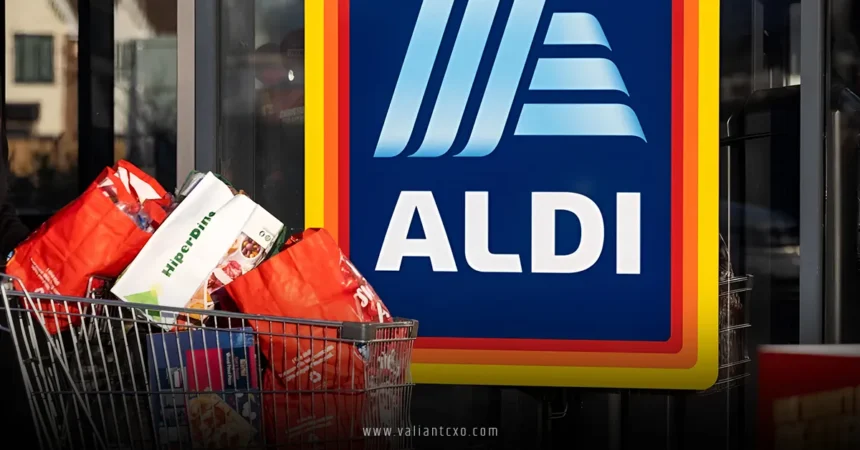Aldi loses cheapest supermarket status for the first time in nearly two years, and it’s sending ripples through the UK grocery scene. For budget-conscious shoppers, this news feels like a plot twist in a favorite TV show—unexpected and a bit unsettling. Aldi has long been the go-to for those looking to stretch their pounds, but its rival, Lidl, has swooped in to claim the crown. So, what’s behind this shift? Why did Aldi lose its edge, and how should you adjust your shopping strategy? Let’s unpack this grocery drama with a conversational deep dive, exploring the reasons, impacts, and what it means for your wallet.
Why Aldi Loses Cheapest Supermarket Crown to Lidl
A Tight Race: Price Comparison Breakdown
Aldi Loses Cheapest Supermarket Title:When Aldi loses cheapest supermarket status, it’s not by a landslide. According to recent price analysis by consumer group Which?, a basket of 76 popular grocery items—think bread, milk, cheese, and own-brand staples—cost £129.25 at Aldi in July 2025. Lidl, however, edged it out at £128.40, or £128 with their Lidl Plus loyalty card. That’s a difference of less than a pound! It’s like choosing between two cups of coffee where one’s just a tad cheaper—but every penny counts when you’re pinching them.
This razor-thin margin shows how fiercely these German discounters compete. Both Aldi and Lidl have built empires on low prices, but Lidl’s slight edge this time around stems from strategic discounts and loyalty perks. While Aldi sticks to its no-loyalty-card policy, Lidl’s Plus scheme shaved off an extra 40p, tipping the scales. It’s a reminder that small tweaks in pricing strategy can make or break a supermarket’s “cheapest” title.
The Role of Loyalty Programs in the Shift
Aldi Loses Cheapest Supermarket Title :Loyalty programs are the secret sauce in this supermarket showdown. When Aldi loses cheapest supermarket status, it’s partly because it doesn’t offer a loyalty scheme like Lidl’s. Lidl Plus members get exclusive discounts, which helped lower their basket price. Meanwhile, Aldi’s philosophy is all about simplicity—low prices for everyone, no strings attached. But is that enough in today’s market? It’s like showing up to a potluck with a solid dish but no extra flair, while Lidl brings the dessert that wins the crowd.
Other supermarkets like Tesco and Sainsbury’s also lean heavily on loyalty cards (Clubcard and Nectar, respectively), offering savings of up to 6.7% on larger shops. Without a loyalty program, Aldi’s straightforward pricing might not always keep up, especially when competitors dangle personalized discounts. This gap could be a key reason Aldi loses cheapest supermarket title, as shoppers with loyalty cards at Lidl get that extra nudge toward savings.
The Bigger Picture: Why Aldi Held the Title for So Long
Aldi’s Winning Formula
Aldi Loses Cheapest Supermarket Title:Aldi’s reign as the UK’s cheapest supermarket for 20 months wasn’t just luck—it was strategy. Their no-frills model is like a lean, mean, money-saving machine. They stock mostly own-brand products (about 90%), skip fancy store decor, and keep staffing minimal. Ever wonder why you return your cart for a coin? It’s not just quirky—it saves Aldi on labor costs, which translates to lower prices for you.
They also negotiate hard with suppliers, avoiding the premium shelf-space fees other chains charge. It’s like Aldi’s playing chess while others are playing checkers, always thinking two moves ahead to keep costs down. This approach made Aldi a household name for budget shoppers, earning them the Which? Cheapest Supermarket title for three years running (2021–2023). So, when Aldi loses cheapest supermarket status, it’s a big deal—it’s like a champion boxer losing their belt after a long winning streak.
The Cost-of-Living Crisis and Changing Shopper Habits
Aldi Loses Cheapest Supermarket Title:The cost-of-living crisis has shoppers on edge, hunting for every deal they can find. Food inflation hit 4% in July 2025, with staples like meat and tea spiking even higher. Families are switching to simpler meals, leaning on own-brand products to save cash. Aldi and Lidl thrive in this environment, offering affordable alternatives to pricier supermarkets like Waitrose, where a similar basket costs £170.91—over £40 more than Lidl!
But when Aldi loses cheapest supermarket title, it’s a signal that even the budget giants aren’t immune to inflationary pressures. Global supply squeezes and last year’s tax hikes have pushed prices up across the board. Lidl’s ability to absorb some of these costs through loyalty discounts gave it the edge, but both chains remain far cheaper than traditional supermarkets like Tesco or Morrisons.
What Does It Mean When Aldi Loses Cheapest Supermarket Status?
Impact on Shoppers
Aldi Loses Cheapest Supermarket Title:For the average shopper, Aldi losing cheapest supermarket status might feel like a betrayal. If you’ve been loyally pushing your cart through Aldi’s aisles, expecting the absolute lowest prices, this shift could make you second-guess your routine. But let’s put it in perspective: the difference is less than a quid. It’s not like Aldi’s suddenly charging Waitrose prices. Both Aldi and Lidl are still leagues ahead of competitors, saving you £17–£40 compared to Tesco or Waitrose.
The real question is whether this shift will change where you shop. Lidl’s win might tempt you to try their stores, especially if you’re open to joining their loyalty program. But if you’re an Aldi die-hard, the convenience of your local store or preference for their products might keep you loyal. It’s like choosing between two favorite coffee shops—sometimes you stick with what you know, even if the other’s a bit cheaper.
The Rise of Lidl’s Market Share
Lidl’s not just winning on price—they’re gaining ground overall. In July 2025, Lidl hit a record 8.3% market share in the UK, up 0.5 points, with over 500,000 new customers flocking to their stores. It’s like Lidl’s throwing a party and everyone’s showing up. Meanwhile, Aldi’s still a powerhouse, with a 9.3% market share and plans to open 500 more UK stores. When Aldi loses cheapest supermarket title, it doesn’t mean they’re losing customers—just that Lidl’s playing the game a bit smarter right now.
How to Save Money After Aldi Loses Cheapest Supermarket Title
Shop Smart: Compare and Combine
When Aldi loses cheapest supermarket status, it’s a wake-up call to shop smarter. Don’t just stick to one store out of habit. Compare prices weekly—Which? does monthly analyses, but apps like Trolley.co.uk can give you real-time price checks across supermarkets. It’s like having a personal shopper whispering the best deals in your ear.
Mix and match your shopping. For smaller baskets, Lidl’s your new best friend, especially with a loyalty card. For bigger shops, Asda’s topping the charts at £474.12 for 192 items, beating Tesco’s Clubcard prices by £7.47. Think of it like assembling a playlist—you pick the best tracks from different albums to get the perfect mix.
Leverage Loyalty Programs
If you’re not already using loyalty cards, now’s the time. Lidl Plus, Tesco Clubcard, and Sainsbury’s Nectar can shave serious cash off your bill. For example, Tesco’s Clubcard saved 6.3% on larger shops, while Sainsbury’s Nectar card cut 6.7%. Without these, you could pay £30 more at Tesco or Sainsbury’s for the same trolley. It’s like paying for a fancy dinner when you could’ve had the same meal at home for less.
Aldi’s lack of a loyalty program might be a drawback, but their baseline prices are still competitive. If you’re loyal to Aldi, focus on their Specialbuys—those middle-aisle deals can save you on non-grocery items, balancing out your budget.
Hunt for Own-Brand Bargains
Both Aldi and Lidl excel at own-brand products, which are often 20–30% cheaper than name brands. When Aldi loses cheapest supermarket title, it’s still a haven for budget buys like their own-brand pasta or canned goods. Lidl’s own brands are just as good, often indistinguishable in blind taste tests. It’s like choosing between two great home-cooked meals—both fill you up, but one might cost a bit less.
The Future of Supermarket Pricing
Will Aldi Reclaim the Crown?
Aldi’s not down for the count. When Aldi loses cheapest supermarket status, it’s a temporary setback. They’ve got a history of bouncing back, as seen in their three-year run as Which?’s cheapest supermarket. Aldi’s expansion plans—500 new UK stores—show they’re in it for the long haul. They might tweak their pricing or introduce new promotions to regain the title. It’s like a sports team losing a game but gearing up for the championship.
Lidl, meanwhile, is riding high. Their loyalty program and aggressive pricing could keep them ahead, but Aldi’s simplicity and loyal customer base are tough to beat. The battle between these discounters is like a tug-of-war—each side’s got muscle, and it’s anyone’s game.
The Role of Inflation and Policy
Food inflation’s not going anywhere soon, with the British Retail Consortium noting a 4% rise in July 2025. Government policies, like last year’s tax hikes, are also pushing prices up. When Aldi loses cheapest supermarket title, it’s partly a symptom of these broader pressures. Both Aldi and Lidl are fighting to keep prices low, but global supply issues (like meat and tea shortages) make it tough. It’s like trying to keep a boat steady in choppy waters—everyone’s feeling the waves.
How Other Supermarkets Stack Up
Asda’s Dominance in Bigger Shops
For larger shopping trips, Aldi and Lidl often get left out because they don’t stock enough branded items. Here, Asda shines, averaging £474.12 for 192 items, compared to Waitrose’s whopping £538.33. That’s a 14% difference! Asda’s like the reliable friend who always shows up with exactly what you need, no fuss.
Tesco and Sainsbury’s are competitive with loyalty cards, but without them, you’re paying premium prices. Morrisons lags behind, with minimal savings even for More cardholders. It’s a reminder that when Aldi loses cheapest supermarket title for smaller baskets, other players like Asda can still save you big on larger hauls.
Waitrose: The Pricey Outlier
Waitrose is the luxury car of supermarkets—great quality, but you pay for it. At £170.91 for 76 items, it’s £42 more than Lidl. If you’re shopping there, you’re prioritizing quality or convenience over cost. It’s like choosing a gourmet burger over a fast-food one—both satisfy, but one’s a splurge.
Conclusion
Aldi Loses Cheapest Supermarket Title:When Aldi loses cheapest supermarket status to Lidl, it’s a shake-up that reminds us to stay sharp as shoppers. The difference may be small—less than £1—but it highlights how competitive the UK grocery market is. Aldi’s still a budget powerhouse, but Lidl’s loyalty program and slight price edge have given it the crown for now. By shopping smart, comparing prices, and leveraging loyalty schemes, you can keep your grocery bill low no matter who’s on top. So, grab your reusable bags, check those prices, and keep hunting for the best deals—your wallet deserves it!
FAQs
Why did Aldi lose the cheapest supermarket title in 2025?
Aldi loses cheapest supermarket status because Lidl offered a slightly lower price (£128 vs. £129.25) for a basket of 76 items, boosted by their Lidl Plus loyalty program, according to Which?’s July 2025 analysis.
How can shoppers save money after Aldi loses cheapest supermarket status?
Shoppers can save by comparing prices across supermarkets, using loyalty programs like Lidl Plus or Tesco Clubcard, and sticking to own-brand products, which are cheaper at both Aldi and Lidl.
Does Aldi’s loss of the cheapest supermarket title affect its quality?
No, Aldi losing cheapest supermarket status doesn’t impact its quality. Aldi’s own-brand products remain high-quality and affordable, often matching or beating competitors in taste tests.
How often does Which? conduct supermarket price comparisons?
Which? conducts monthly price comparisons, analyzing baskets of groceries across major UK supermarkets to determine the cheapest, helping shoppers stay informed about deals.
Will Aldi regain the cheapest supermarket title soon?
It’s possible! Aldi’s history of low prices and expansion plans suggest they could reclaim the title, but it depends on how they respond to Lidl’s pricing and loyalty strategies.
Read More:valiantcxo.com


